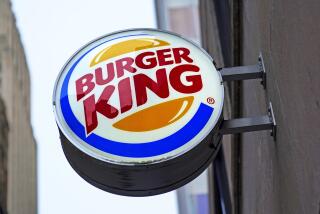Ad critics want no Bad Apples
Sugary, salty, refined-flour cereals aren’t exactly rare, of course. But some critics charge that Kellogg Co. is adding insult to injury by disparaging real apples in a new advertising campaign for its popular Apple Jacks breakfast cereal.
The Apple Jacks ads on television and the company’s website feature a “grouchy,” “sour,” “meddling” and “scheming” Bad Apple who races a “laid-back,” “happy” and “confident” cinnamon stick to be first to get into a bowl of Apple Jacks. Bad Apple tries to cheat in the race, but it is CinnaMon the cinnamon stick who prevails. A voice proclaims, “Apple Jacks don’t taste like apples because the taste of sweet cinnamon is the winner, mon.”
The reference to Apple Jacks not tasting like apples reflects the somewhat odd name of the cereal: It doesn’t taste of apples, and apples are lower on the ingredients list than sugar or salt.
To some fruit and vegetable enthusiasts, the Kellogg campaign is a little much.
“It’s one thing for advertisers to market to kids these high-sugar-content cereals. It’s another to compound that by implying apples aren’t in themselves a good product,” said Elizabeth Pivonka, president of the nonprofit Produce for Better Health Foundation, which promotes fruit and vegetable consumption partly with funds from the produce industry. “What were they thinking?” she said.
The produce foundation has teamed with the Center for Science in the Public Interest, a Washington, D.C.-based consumer advocacy group, in writing to Kellogg’s chief executive, asking that the marketing campaign cease immediately.
Jenny Enochson, a spokeswoman for Kellogg Co. in Battle Creek, Mich., said the campaign “is not intended to disparage apples or discourage children from eating apples.” Rather, she described the purpose of the ads as a “lighthearted and fun way to communicate the cinnamon great taste of the cereal.”
Although Enochson said Kellogg would consider the concerns raised in the letter, she pointed out that the Apple Jacks campaign also underscored the need for a balanced breakfast by featuring fruit or fruit juice in the advertisements.
Dr. David Heber, director of the UCLA Center for Human Nutrition, said that on an average day, 45% of children eat no fruit and 20% eat less than one serving of vegetables. “I hope Kellogg’s corrects this advertising campaign,” he said.
The effect of food marketing on children’s diet and health is getting a lot of attention: It was discussed at a government-sponsored workshop in July and is the subject of a congressional study being conducted by the Institute of Medicine.
“We know that food advertising has great effects on kids, just as it does adults,” said Kristen Harrison, a social psychologist at the University of Illinois in Urbana who studies food marketing to kids and who said she shared concern about such ads. But, she said, “we find very little evidence that one little ad can have sweeping effects.”
More to Read
Eat your way across L.A.
Get our weekly Tasting Notes newsletter for reviews, news and more.
You may occasionally receive promotional content from the Los Angeles Times.









